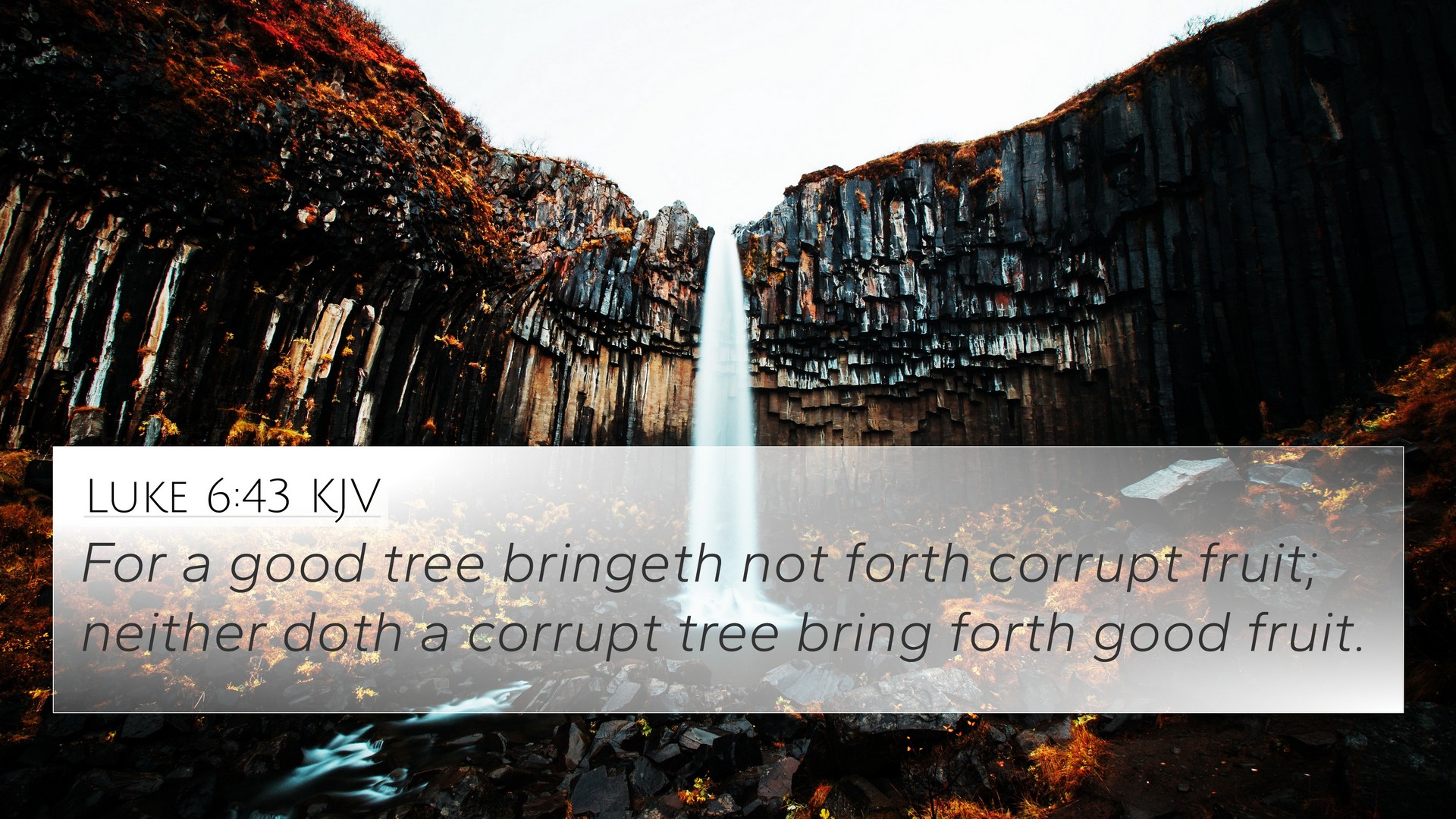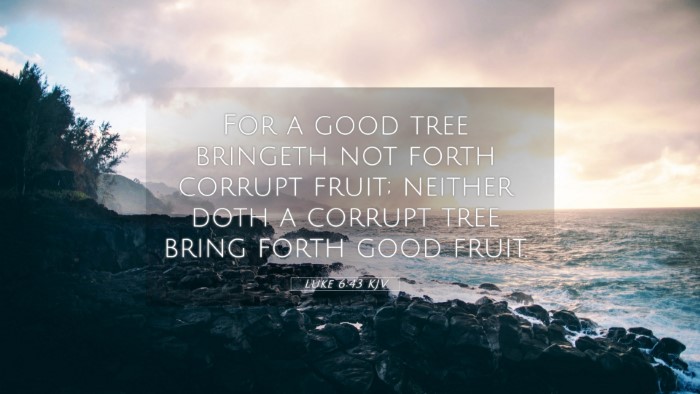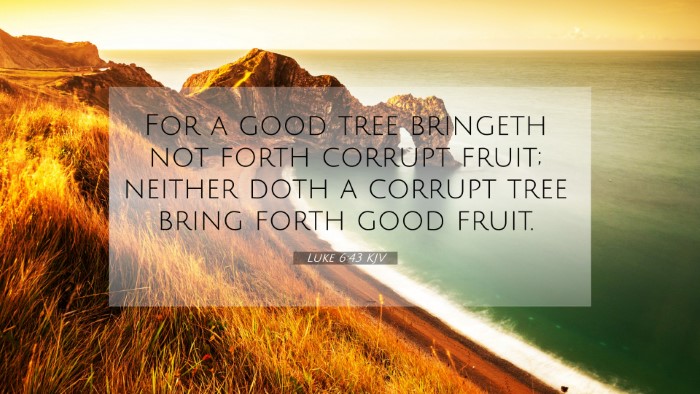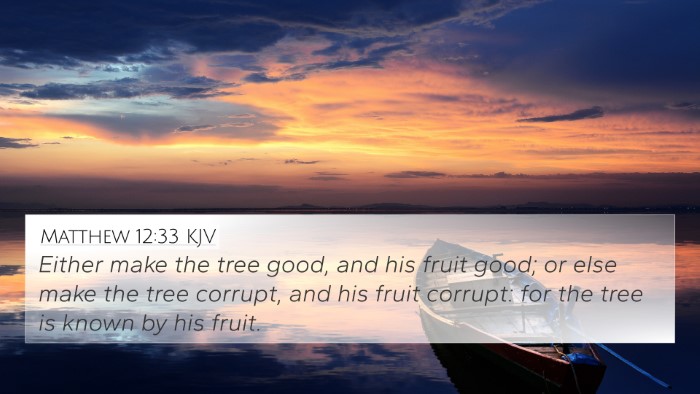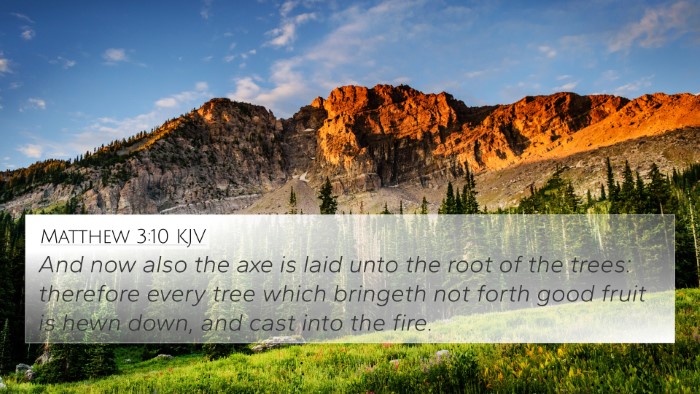Understanding Luke 6:43
Luke 6:43 states: "For a good tree bringeth not forth corrupt fruit; neither doth a corrupt tree bring forth good fruit." This verse emphasizes the intrinsic relationship between a tree and its fruit, serving as a metaphor for moral character and the behavior of individuals. Below, we will explore its meaning through insights from public domain commentaries including Matthew Henry, Albert Barnes, and Adam Clarke.
Meaning and Interpretation
The significance of Luke 6:43 lies in the principle it communicates regarding the nature of good and evil. A good tree, which symbolizes a righteous life, will naturally produce good deeds, while a corrupt tree, standing for a sinful life, will yield bad actions. This symbolizes the idea that a person's character is directly reflected in their actions.
Commentary Insights
-
Matthew Henry's Commentary:
Henry emphasizes that the condition of the heart determines the nature of one’s actions. A good heart, filled with divine grace, will produce actions that align with God's will, while a corrupted heart leads to sinful behaviors. He points out that this parable warns against hypocrisy, as outward appearances do not guarantee inner goodness.
-
Albert Barnes' Notes:
Barnes notes the importance of examining the source of one’s actions. He asserts that just like trees are known by their fruits, people are identified by their actions, which indicate their true spiritual condition. The insight he provides revolves around the necessity of genuine transformation from within, not merely external modification of behavior.
-
Adam Clarke's Commentary:
Clarke discusses the metaphorical implications of the verse, asserting the truth that holiness can't arise from an impure source. He elucidates that the verse serves as a reminder of God’s judgment, suggesting that good works stem from a life devoted to Christ, while bad deeds expose a heart estranged from Him.
Cross-References for Luke 6:43
Several Bible verses offer foundational connections and themes that align with Luke 6:43:
- Matthew 7:16-20: Discusses identifying people by their fruits, mirroring the message of Luke 6:43.
- John 15:5: Highlights that apart from Christ, one cannot bear fruit, illustrating the connection between source and outcome.
- Galatians 5:22-23: Lists the fruits of the Spirit, providing insight into the good fruit a believer should produce.
- James 3:12: Questions whether a fig tree can bear olives, reinforcing the premise that a good tree produces good fruit.
- Proverbs 4:23: Advises guarding the heart, as it determines the course of life, echoing the idea of inner goodness reflecting outward actions.
- Romans 7:18: Reflects on the struggle between the desire to do good and the presence of sin, reinforcing the idea that our nature impacts our actions.
- Colossians 1:10: Encourages bearing fruit in every good work, connecting the believer’s life to good fruit production.
Practical Applications
Understanding Luke 6:43 encourages believers to:
- Reflect on their own actions to assess their spiritual state.
- Seek inner transformation through Christ to produce good works naturally.
- Practice discernment and evaluate the teachings and behaviors of others based on Scripture.
Tools for Further Study
To delve deeper into the themes presented in Luke 6:43, consider utilizing:
- Bible Concordance: To explore additional verses that mention fruits and trees.
- Bible Cross-Reference Guide: For finding related scriptures that discuss the nature of goodness and evil.
- Cross-Reference Bible Study: Methods aimed at discovering profound connections between scriptures.
- Comprehensive Bible Cross-Reference Materials: These materials enable a detailed examination of biblical themes and principles.
Conclusion
In summary, Luke 6:43 serves as a potent reminder that our actions are a direct reflection of our inner character and spiritual health. By understanding this verse and its broader context within Scripture, believers can cultivate a life that bears good fruit, aligned with God’s will and purposes.
